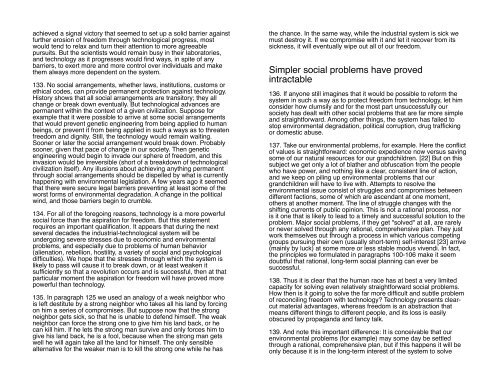Unabomber Manifesto - ouroboros ponderosa
Unabomber Manifesto - ouroboros ponderosa
Unabomber Manifesto - ouroboros ponderosa
Create successful ePaper yourself
Turn your PDF publications into a flip-book with our unique Google optimized e-Paper software.
achieved a signal victory that seemed to set up a solid barrier againstfurther erosion of freedom through technological progress, mostwould tend to relax and turn their attention to more agreeablepursuits. But the scientists would remain busy in their laboratories,and technology as it progresses would find ways, in spite of anybarriers, to exert more and more control over individuals and makethem always more dependent on the system.133. No social arrangements, whether laws, institutions, customs orethical codes, can provide permanent protection against technology.History shows that all social arrangements are transitory; they allchange or break down eventually. But technological advances arepermanent within the context of a given civilization. Suppose forexample that it were possible to arrive at some social arrangementsthat would prevent genetic engineering from being applied to humanbeings, or prevent it from being applied in such a ways as to threatenfreedom and dignity. Still, the technology would remain waiting.Sooner or later the social arrangement would break down. Probablysooner, given that pace of change in our society. Then geneticengineering would begin to invade our sphere of freedom, and thisinvasion would be irreversible (short of a breakdown of technologicalcivilization itself). Any illusions about achieving anything permanentthrough social arrangements should be dispelled by what is currentlyhappening with environmental legislation. A few years ago it seemedthat there were secure legal barriers preventing at least some of theworst forms of environmental degradation. A change in the politicalwind, and those barriers begin to crumble.134. For all of the foregoing reasons, technology is a more powerfulsocial force than the aspiration for freedom. But this statementrequires an important qualification. It appears that during the nextseveral decades the industrial-technological system will beundergoing severe stresses due to economic and environmentalproblems, and especially due to problems of human behavior(alienation, rebellion, hostility, a variety of social and psychologicaldifficulties). We hope that the stresses through which the system islikely to pass will cause it to break down, or at least weaken itsufficiently so that a revolution occurs and is successful, then at thatparticular moment the aspiration for freedom will have proved morepowerful than technology.135. In paragraph 125 we used an analogy of a weak neighbor whois left destitute by a strong neighbor who takes all his land by forcingon him a series of compromises. But suppose now that the strongneighbor gets sick, so that he is unable to defend himself. The weakneighbor can force the strong one to give him his land back, or hecan kill him. If he lets the strong man survive and only forces him togive his land back, he is a fool, because when the strong man getswell he will again take all the land for himself. The only sensiblealternative for the weaker man is to kill the strong one while he hasthe chance. In the same way, while the industrial system is sick wemust destroy it. If we compromise with it and let it recover from itssickness, it will eventually wipe out all of our freedom.Simpler social problems have provedintractable136. If anyone still imagines that it would be possible to reform thesystem in such a way as to protect freedom from technology, let himconsider how clumsily and for the most part unsuccessfully oursociety has dealt with other social problems that are far more simpleand straightforward. Among other things, the system has failed tostop environmental degradation, political corruption, drug traffickingor domestic abuse.137. Take our environmental problems, for example. Here the conflictof values is straightforward: economic expedience now versus savingsome of our natural resources for our grandchildren. [22] But on thissubject we get only a lot of blather and obfuscation from the peoplewho have power, and nothing like a clear, consistent line of action,and we keep on piling up environmental problems that ourgrandchildren will have to live with. Attempts to resolve theenvironmental issue consist of struggles and compromises betweendifferent factions, some of which are ascendant at one moment,others at another moment. The line of struggle changes with theshifting currents of public opinion. This is not a rational process, noris it one that is likely to lead to a timely and successful solution to theproblem. Major social problems, if they get "solved" at all, are rarelyor never solved through any rational, comprehensive plan. They justwork themselves out through a process in which various competinggroups pursuing their own (usually short-term) self-interest [23] arrive(mainly by luck) at some more or less stable modus vivendi. In fact,the principles we formulated in paragraphs 100-106 make it seemdoubtful that rational, long-term social planning can ever besuccessful.138. Thus it is clear that the human race has at best a very limitedcapacity for solving even relatively straightforward social problems.How then is it going to solve the far more difficult and subtle problemof reconciling freedom with technology? Technology presents clearcutmaterial advantages, whereas freedom is an abstraction thatmeans different things to different people, and its loss is easilyobscured by propaganda and fancy talk.139. And note this important difference: It is conceivable that ourenvironmental problems (for example) may some day be settledthrough a rational, comprehensive plan, but if this happens it will beonly because it is in the long-term interest of the system to solve






